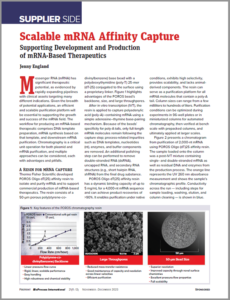- Sponsored Content
- Fill/Finish
Scalable mRNA Affinity Capture: Supporting Development and Production of mRNA-Based TherapeuticsScalable mRNA Affinity Capture: Supporting Development and Production of mRNA-Based Therapeutics
November 16, 2023
Sponsored by Thermo Fisher Scientific
 As a direct result of the COVID-19 pandemic, mRNA-based therapeutics have made significant clinical and commercial progress. With many such therapeutics filling up the clinical pipeline for a growing number of indications, the biopharmaceutical industry is investigating efficient and scalable manufacturing techniques. For example, Thermo Fisher Scientific has developed a novel affinity chromatography resin with a poly(styrene-co-divinylbenzene) backbone and with throughpores to isolate and purify mRNA at various scales. Because the POROS Oligo dT(25) affinity resin binds mRNA through a simple adenine–thymine base-pairing mechanism, it can serve as a purification platform for all mRNA molecules containing a poly-A tail.
As a direct result of the COVID-19 pandemic, mRNA-based therapeutics have made significant clinical and commercial progress. With many such therapeutics filling up the clinical pipeline for a growing number of indications, the biopharmaceutical industry is investigating efficient and scalable manufacturing techniques. For example, Thermo Fisher Scientific has developed a novel affinity chromatography resin with a poly(styrene-co-divinylbenzene) backbone and with throughpores to isolate and purify mRNA at various scales. Because the POROS Oligo dT(25) affinity resin binds mRNA through a simple adenine–thymine base-pairing mechanism, it can serve as a purification platform for all mRNA molecules containing a poly-A tail.
In this article, a Thermo Fisher scientist describes the advantages of affinity capture for mRNA therapeutics, then explores considerations for optimizing capture, including the influences of product size on precipitation point, resin dynamic binding capacity (DBC), and process elution conditions. Download the article now to learn how the POROS Oligo dT(25) affinity resin can help to maximize process efficiency and simplify mRNA purification from the laboratory benchtop to the manufacturing floor.
Fill out the form below to read the full article now.
You May Also Like





